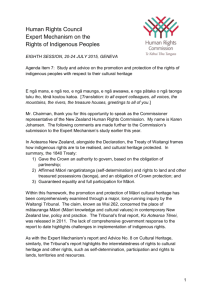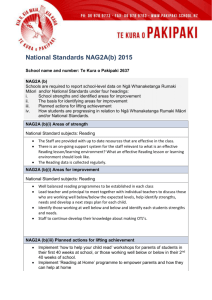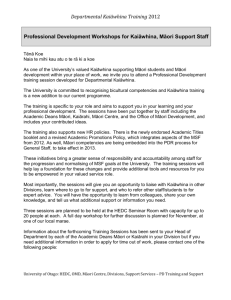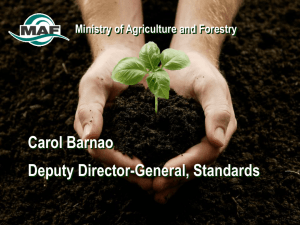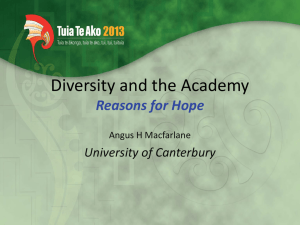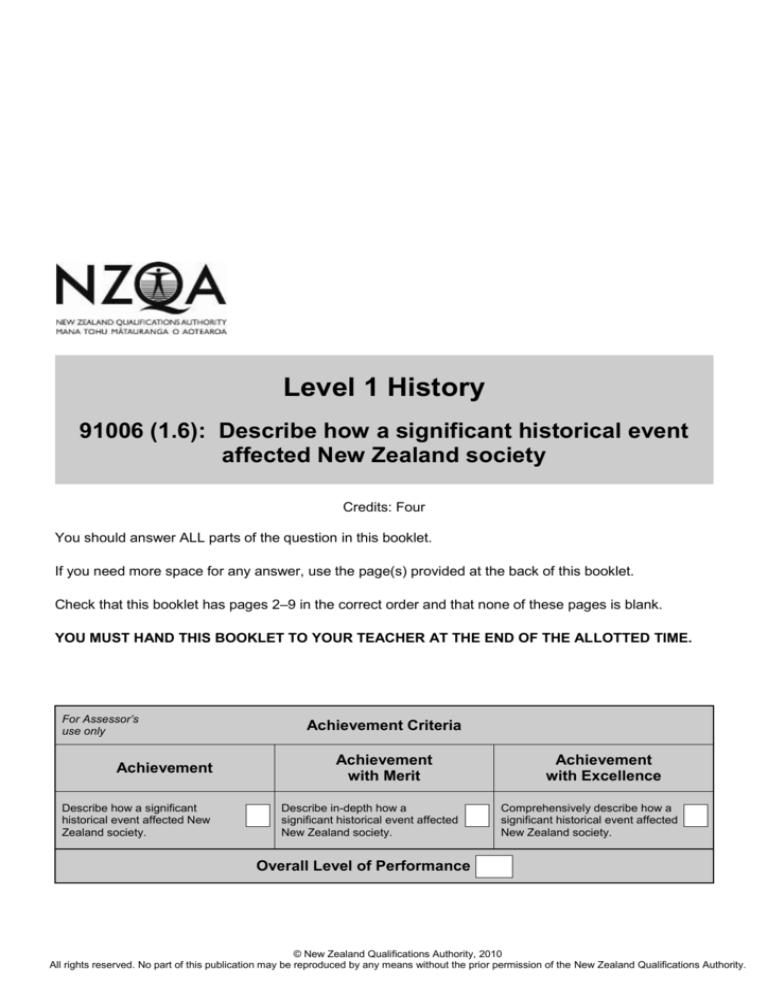
Level 1 History
91006 (1.6): Describe how a significant historical event
affected New Zealand society
Credits: Four
You should answer ALL parts of the question in this booklet.
If you need more space for any answer, use the page(s) provided at the back of this booklet.
Check that this booklet has pages 2–9 in the correct order and that none of these pages is blank.
YOU MUST HAND THIS BOOKLET TO YOUR TEACHER AT THE END OF THE ALLOTTED TIME.
For Assessor’s
use only
Achievement
Describe how a significant
historical event affected New
Zealand society.
Achievement Criteria
Achievement
with Merit
Describe in-depth how a
significant historical event affected
New Zealand society.
Achievement
with Excellence
Comprehensively describe how a
significant historical event affected
New Zealand society.
Overall Level of Performance
© New Zealand Qualifications Authority, 2010
All rights reserved. No part of this publication may be reproduced by any means without the prior permission of the New Zealand Qualifications Authority.
2
Sample assessment answer NCEA level 1: History 91006 (1.6)
Assessor’s
use only
You are advised to spend 60 minutes answering the questions in this booklet.
Throughout our history there have been significant historical events. These events have affected New
Zealand society in different ways. New Zealand society in this context could include individuals,
groups, communities, or even all New Zealanders.
Choose ONE significant historical event you have studied this year. You may select an event listed in the
box below OR another event of your own choice.
Land March
Springbok Tour
Passchendaele
1935 Election
1953 Waterfront Strike
Bombing of the Rainbow Warrior
Signing of the Treaty of Waitangi in 1840
1913 Waihi Strike
Women getting the vote in 1893.
Use your chosen historical event to complete the tasks on the following pages.
Identify the significant historical event you have chosen in the space below.
Event: World War Two
People /group involved in the historical event
How the events affected these people/this group
1. Soldiers of the Māori Battalion who served in
World War Two
- WW2 prompted many Māori men to sign up (ie:
to go on an adventure, prove themselves as
NZers)
- Many soldiers became casualties during the war
- Māori Battalion gained huge respect for their
fighting qualities from comrades and the enemy
- Returning soldiers were often disillusioned by
their experience and their reception at home
History 91006 (1.6)
3
2. Women and others who were left behind in
New Zealand while their men were fighting
overseas
- Women worked on the home front: preparing Assessor’s
use only
food, moving to cities to work in factories, knitted
balaclavas, socks etc
- Māori War Effort Organisation was established
nationwide
- Women and families grieved for killed or
wounded soldiers
History 91006 (1.6)
4
QUESTION
(a)
Assessor’s
use only
Describe what happened in the historical event that you have chosen.
World War Two broke out in 1939 as a result of the German invasion of Poland. Britain declared
war on Germany, and New Zealand followed immediately with its own declaration of war. New
Zealand, just as we did in World War One, had close ties to Britain and decided “where she goes,
we go”. Māori communities responded with as much vigour as the rest of New Zealand. In
particular Māori from the East Coast of the North Island signed up enthusiastically. Other Māori
tribes, such as those in the Waikato region, were more reluctant to sacrifice their men with
memories of the New Zealand wars and land confiscation still strong.
Despite the reservations of the New Zealand Government, Churchill and the British decided to ask
the New Zealand contingent to fight in Europe. This worried New Zealand as her perceived threat
was more likely to be Japan because of its geographical location. The fall of Singapore to the
Japanese in 1942 only heightened those fears. The New Zealand 2nd Expeditionary Force
(NZEF)set sail for Egypt in order to stop the German advance into the Mediterranean. Amongst
them was the 28th Māori Battalion who for the first time were operating as a distinctly Māori unit,
divided into four companies based along tribal and geographical lines.
The New Zealand forces fought first in Greece and then Crete. Both these engagements were a
disaster for the poorly equipped and sometimes poorly led New Zealanders. Along with other allied
soldiers they were evacuated again to Egypt. The NZEF then fought in North Africa, eventually
pushing Rommel’s German forces out via famous battles such as El Alamein. The New Zealanders
and other allied forces crossed into Italy and encountered stubborn resistance, losing many lives at
the difficult battle of Monte Cassino. The Māori Battalion was in the thick of all these campaigns,
and distinguished themselves in battle. In particular the Māori Battalion was involved in heavy
fighting at El Alamein, Takrouna and Cassino. Moana-nui-a Kiwa Ngarimu was awarded the
Victoria Cross for leading an attack on Point 209, at Tebaga Gap in Tunisia, destroying German
machine-gun posts and stopping a fierce counter-attack. By the time the New Zealand forces
reached Trieste in northern Italy the war was all but over. The German forces had eventually been
defeated in northern Europe by Stalin’s Red Army in the East and principally by the British and
American forces in the West. By the time the allies and the Russians had reached Berlin in 1945,
50 million people are estimated to have died. 140,000 New Zealanders served overseas with
approximately 12,000 fatalities. The Māori Battalion returned home having forged a reputation as
brave and formidable soldiers. However, they also suffered greatly with a casualty rate of 50%,
higher than any other battalion. Maori felt they had also gained a new respect amongst Pakeha
New Zealanders as a result of their sacrifices in the war.
History 91006 (1.6)
5
(b)
Describe how the TWO different people OR groups in society that you identified earlier were
affected by the historical event you have chosen.
Person /group 1: The Māori Battalion
From training through to combat the Māori Battalion were affected by World War Two. A
strong sense of comradeship developed within the companies of the battalion. Māori also
drew upon their “warrior tradition” and used haka, waiata and traditional fighting practices to
strengthen their contribution to the fighting force. For example, the haka peruperu “Ka Eke i
te Wīwī” was historically used before battle.
Māori fought with the New Zealand Expeditionary Force (NZEF) in the Mediterranean, North
Africa and Italy. They were affected badly by the war and suffered a 50% casualty rate,
which was higher than other battalions in the NZEF. Many Māori soldiers were affected by
the experience of war, both in battle and afterwards. Many returned with wounds, both
psychological and physical. Others commented on the positive outcome of serving alongside
Pākehā soldiers as equals in World War Two. Sir Apirana Ngata stated that, as a result of
the war, “the future of our race as a component and respected part of the New Zealand
people will be less precarious”.
Person /group 2: Women at the home front
Women at home in New Zealand were affected by the participation of New Zealanders in
World War Two. Apart from being left to grieve for their loved ones who may have been killed
or wounded overseas, women often had to fill the gap left behind by men in essential
industries such as factory work and farming. Māori women in particular worked hard to
provide food for soldiers. This included seafood and pork, which was either dried or
preserved in fat for the long journey to Europe. Many women moved to the cities to work in
essential industries, which in turn started the process of post-war Māori urbanisation.
Princess Te Puea is an example of a Māori leader who was said to have raised at least
£30,000 for the war effort.
History 91006 (1.6)
Assessor’s
use only
6
(c)
Explain why your chosen historical event was of significance to New Zealanders.
In your answer, you could discuss aspects such as:
the importance of the event to people alive at the time
how deeply people’s lives were affected at the time
the extent to which the event continues to affect New Zealand society
The event of World War Two was also important for New Zealanders as it affected every
aspect of people’s lives – from the soldiers serving overseas to the home front where
women worked in essential industries. Men formed territorial divisions and schools
continued to emphasise commitment to the British Empire.
To New Zealanders alive at the time, World War Two was very significant. As soon as
the call to arms was made, Māori men from all over New Zealand signed up to go on an
“adventure”. For some it was a genuine desire to honour the citizenship rights bestowed
on them by the Treaty of Waitangi. For many it was an opportunity to escape the
generally poor, rural lifestyle they had grown up with at home. For Māori leaders such as
Sir Apirana Ngata, the importance of the Māori war effort could not be understated. He
described it as the “price of citizenship”.
People’s lives were affected deeply at the time. In particular, stories of casualties of both
wounded and killed affected small and large communities. For the Māori Battalion
whānau would have been deeply affected due to the nature of close, extended family
ties. Many Māori communities lamented the loss of leadership created by the sacrifice of
its young men in the war.
World War Two, and the Māori Battalion’s contribution to it, continues to affect New
Zealand society today. Almost every town in New Zealand has a war memorial dedicated
to soldiers who lost their lives. In the Māori world the deeds of the 28th Māori Battalion
are remembered through carvings, song and oral tradition. For example, Uenuku Fairhall
wrote the haka “Haane” to celebrate the achievements of Haane Manahi and, in a
broader sense, the achievements of B Company.
History 91006 (1.6)
Assesso
use onl




